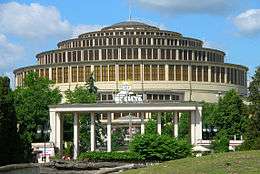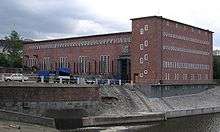Max Berg
Max Berg (17 April 1870 – 22 January 1947) was a German architect and urban planner.
Biography


Berg was born in Stettin (now Szczecin, Poland) in Pomerania, then part of the German Empire. He attended the Technical University in Charlottenburg, where he was taught by Carl Schäfer who favoured Gothic architecture. Berg was also taught by Franz Adickes (1846–1915), an important urban planner.
In 1909 Berg was appointed senior building official in Breslau (now Wrocław, Poland), in Silesia. His most notable contribution to architecture is the Jahrhunderthalle (Centennial Hall) built between 1911 and 1913 as part of a series of works commemorating the 100th anniversary of the 1813 War of Liberation against Napoleon Bonaparte. The Hall, an important early landmark of European reinforced concrete buildings, survived World War II, and in 2006 was designated a UNESCO World Heritage Site.
Other works in Breslau (Wrocław) include the market hall (a huge concrete structure of elliptical arches, but appearing more traditional externally) and a large office building on the SW corner of the Main Market Square.
In 1925, the year he retired from his architectural career for Christian mysticism,[1] Berg moved to Berlin and then to Baden-Baden, where he died in 1947, aged 76.
External links
| Wikimedia Commons has media related to Max Berg. |